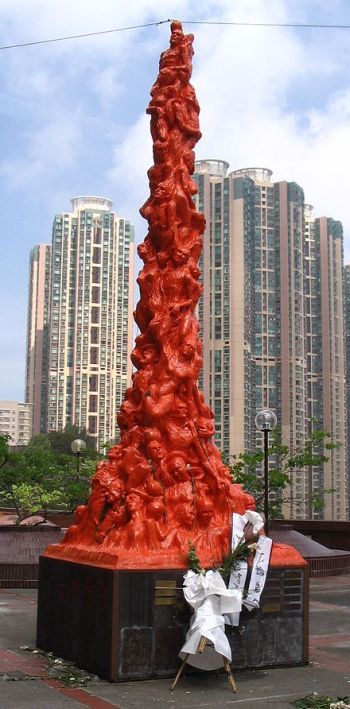
Publisher:
Bonnie King
CONTACT:
Newsroom@Salem-news.com
Advertising:
Adsales@Salem-news.com

~Truth~
~Justice~
~Peace~
TJP
Jan-11-2022 15:07

 TweetFollow @OregonNews
TweetFollow @OregonNews
Destroying Democracy: China in Hong Kong
Mel Gurtov special to Salem-News.comThe new face of Hong Kong is direct Chinese intervention.
 The Pillar of Shame was created to commemorate the 1989 Tiananmen massacre. Photo by Minghong - CC BY-SA 3.0, wikimedia |
(PORTLAND, Ore.) - On July 1, 1997 the United Kingdom formally handed Hong Kong over to China under an agreement that was supposed to give Hong Kong 50 years of autonomy: “one country, two systems,” Deng Xiaoping promised.
That same year, students and professors at the University of Hong Kong erected a statue, called “Pillar of Shame,” to commemorate the 1989 Tiananmen massacre.
The tall sculpture by a Danish artist lasted until the end of 2021 when, in the dead of night, it was carved in half and removed. Two other sculptures of the same event at two other Hong Kong universities were also removed.
The ongoing eclipse of civil society by the PRC authorities could not have been more starkly demonstrated.
It Can Happen Here
Authoritarian rule is by nature incapable of tolerating dissent, the rule of law, freedom of press and speech, and organized political opposition.Institutions erected to support representative government become mere shells, operating to cloak predetermined policies and give the pretense of legitimate authority.
What we are witnessing in Hong Kong under direct rule by Beijing follows that script. The Chinese authorities there, like their bosses in Beijing, are ruthlessly efficient when it comes to curtailing or simply extinguishing democracy.
They force the closure of independent media, arrest leaders of protest movements and other outspoken critics, track and threaten dissidents who have gone abroad (and their families still in China), and create rules that make independent thinkers ineligible to hold office.
All this is accompanied by Orwellian language about promoting real democracy and protecting society from people who "cause trouble" and engage in "subversion."
Many observers took the attitude of “it can’t happen here” because protests in Hong Kong in 2019 and 2020, which started over an extradition bill and broadened to demands for greater autonomy, seemed to have the support of a clear majority of the city’s 7.4 million people.
Beijing surely wouldn’t crack down on a highly visible and defiant uprising in an international trade and financial hub.
The protesters, however, had no central leadership and no game plan, while Beijing controlled the police, the courts, and, if necessary, the People's Liberation Army bivouacked on the edge of the city.
China’s leaders had no interest in negotiating with the demonstrators, apparently believing that to do so would legitimize the protests and weaken its rule.
The new face of Hong Kong is direct Chinese intervention.
It began with Beijing proclaiming the right to "supervise" Hong Kong’s internal affairs, in violation of the Basic Law that was supposed to protect Hong Kong’s autonomy. China’s legislature passed a new national security law and suspended legislative council elections in Hong Kong for a year.
Then, in early 2021, what little remained of democratic governance in Hong Kong was obliterated by imposition of a loyalty oath that candidates for district councils would have to take.
The oath, to China and the Chinese Communist Party, was announced as a test of patriotism and “political reform.”
Hong Kong legislative elections in December 2021 under Beijing’s new rules yielded predictable results. Only “patriots” were allowed to run. Turnout was a record low. Pro-China candidates won all but one seat, including all the directly elected seats that normally would have been won by opposition forces.
Virtually all elements of civil society, such as labor and student unions and nongovernmental organizations, have been disbanded. Leaders of the protest movement have either been arrested or been able to leave Hong Kong.
Independent news sources have disappeared one by one, notably including the arrest of the editors of the independent newspaper Apple Daily, followed by its closure.
The other day, Stand News, the last independent news outlet in Hong Kong, was forced to close, its offices raided by the Hong Kong police and its files seized.
A former member of the Hong Kong Legislative Council said:
- “Our freedom movement, our democratic movement, a large part of it relies on, for us, we have access to truth, we have access to a different narrative compared to the one the government is providing to us. And it's really difficult for us to find a really credible and well-read news media outlet for now.”
Difficult? I would say, impossible.
What Can Be Done?
Hong Kong is not going to become another Xinjiang, but neither will it be just another Chinese province. Hong Kong is a highly visible enclave, a dynamic center of international business with a well-educated Cantonese-speaking population that has its own diaspora. It has voluble supporters in the US Congress, in Australia, and in Canada.Unlike Trump, the Biden administration and members of Congress have responded to China’s policies in Hong Kong with vociferous criticism and sanctions.
Trump reportedly told Xi Jinping in June 2019, that Washington would "tone down" its comments on the spiraling protests. "Very tough situation," Trump tweeted on August 12, 2019, “hope it works out for everybody, including China."
Legislation such as the US Senate’s Hong Kong Human Rights and Democracy Act appropriately sanctioned Chinese and Hong Kong officials, but to little effect.
Not only has Beijing shrugged off the criticism, it has refocused Hong Kong’s economy on those international investors and banks that don’t make an issue of political repression. Instead of experiencing capital flight, Hong Kong has seen a higher inflow of capital as the national security law took effect.
Western sanctions, in short, are proving to be insufficient to derail Xi Jinping’s aims, and China’s apparent reluctance to impose harsh rules on companies and banks that remain in Hong Kong may be helping its cause.
As one observer noted, “The way things are playing out in Hong Kong demonstrates just how hard it will be for Washington and its partners to carry out a comprehensive ‘strategic competition’ with China.”
Hong Kong thus joins the ranks of countries and territories where democracy and social justice demanded by an overwhelming majority of the population has been denied by force.
Belarus and Kazakhstan are other recent examples. The sad reality is that the international community has very few means to protect these populations other than sanctions and shaming.
 Mel Gurtov, syndicated by PeaceVoice, is Professor Emeritus of Political Science at Portland State University and blogs at In the Human Interest.
Mel Gurtov, syndicated by PeaceVoice, is Professor Emeritus of Political Science at Portland State University and blogs at In the Human Interest.
Articles for January 10, 2022 | Articles for January 11, 2022 |
Salem-News.com:




googlec507860f6901db00.html
Terms of Service | Privacy Policy
All comments and messages are approved by people and self promotional links or unacceptable comments are denied.
[Return to Top]
©2025 Salem-News.com. All opinions expressed in this article are those of the author and do not necessarily reflect those of Salem-News.com.